#homeric poems inspirations
Text
Calypso and her maidens: *preparing an entire choreography singing together with Calypso* 🎵 Doooon't go wasting your emotions... Lay all your love on meeeeee! 🎵
Meanwhile Odysseus at the beach: 🎵 Lonely...I'm Mr. Lonely... 🎵
#odysseus#greek mythology#the odyssey#calypso#odysseus and calypso#ogygia#the odyssey 1997#polytalas the one who suffers too much#polytalas#odysseus was severely traumatized#when the vibes match 😆#incorrect odyssey#homeric poems inspirations#homeric poems#homeric epics#my upcoming story
38 notes
·
View notes
Text
The poetry that inspired Jeff Buckley
Aimee Ferrier
Sun 1 October 2023 21:15, UK
Voices as incredible as the one belonging to Jeff Buckley don’t come around too often. Unfortunately, after releasing one record, Grace, Buckley, with all his potential, was taken away too soon. At the age of 30, the singer went for a swim from which he never returned, drowning in the Mississippi River.
Yet, his legacy lives on as one of the most influential artists to emerge from the 1990s, and his music is widely celebrated today for its emotional and lyrical complexity. Not only did Buckley possess an otherworldly voice, but he was also an extremely gifted guitar player and writer, with all his talents combining to create a masterful body of work.
Even when Buckley was covering other artists’ songs, such as ‘Lilac Wine’, ‘The Other Woman’ and ‘Hallelujah’, he imbued the pieces with his own distinctive style. Yet, his penchant for covers wasn’t a reflection of an aversion to writing. Buckley knew how to pen a stunningly poetic track, with songs like ‘Lover, You Should’ve Come Over’ and ‘Morning Theft’ suggesting that even if Buckley didn’t have the vocal pipes he was gifted with, he’d get by just fine as a writer.
Buckley took inspiration from many different writers and musicians when writing his own songs. Musically, Buckley looked back to folk artists like Leonard Cohen, Bob Dylan and, of course, his own father, Tim Buckley, from whom he was estranged. Elsewhere, he loved the work of Pakistani singer Nusrat Fateh Ali Khan, the rich tones of Nina Simone, and Led Zeppelin, calling Robert Plant “my man”.
However, when it came to his literary inspirations, Buckley had an extensive book collection, which he no doubt looked to for ideas when writing his lyrics. He owned a lot of poetry, with Rainer Maria Rilke proving to be a particular favourite. Not only did Buckley own Dunio Elegies, Rilke on Love and Other Difficulties: Translations and Considerations Poems from the Book of Hours, but he also owned his epistolary collection Letters to a Young Poet.
Buckley was also a fan of the classic American poet Walt Whitman, owning Leaves of Grass and From the Soil. Of course, no poetry collection is complete without copies of Arthur Rimbaud’s A Season in Hell and Illuminations, alongside some Charles Baudelaire – Buckley-owned Paris Spleen. The singer also owned the Selected Poems of confessional poet Anne Sexton and modernist writer T.S Eliot.
Check out Buckley’s complete poetry collection below.
The poetry that inspired Jeff Buckley:
Dunio Elegies – Rainer Maria Rilke
Poems from the Book of Hours – Rilke
Rilke on Love and Other Difficulties: Translations and Considerations – Rilke
Leaves of Grass – Walt Whitman
From This Soil – Whitman
The Odyssey – Homer
Early Work, 1970-1979 – Patti Smith
You Get So Alone at Times That it Just Makes Sense – Charles Bukowski
Selected Poems of Ezra Pound
The Complete Lyrics – Hank Williams
A Haiku Journey: Basho’s Narrow Road to a Far Province – Matsuo Basho
Paris Spleen – Charles Baudelaire
The Captain’s Verses – Pablo Neruda
Selected Poems – T.S. Eliot
A Season in Hell and Illuminations – Arthur Rimbaud
Writing and Drawings – Bob Dylan
Ode to Walt Whitman – Federico Garcia Lorca
New Poems: 1962 – Robert Graves
Fear of Dreaming: The Selected Poems – Jim Carroll
Selected Poems of Anne Sexton – Anne Sexton
Selected Poems – John Shaw Neilson
Selected Poems: Summer Knowledge – Demore Schwartz
The Collected Poems of Frank O’Hara – Frank O’Hara
Poems – Pier Paolo Pasolini
Space: And Other Poems – Eliot Katz
Tim Buckley Lyrics
#jeff buckley#jeffbuckley#The poetry that inspired Jeff Buckley#Amiee Ferrier#Dunio Elegies – Rainer Maria Rilke#Poems from the Book of Hours – Rilke#Rilke on Love and Other Difficulties: Translations and Considerations – Rilke#Leaves of Grass – Walt Whitman#From This Soil – Whitman#The Odyssey – Homer#Early Work#1970-1979 – Patti Smith#You Get So Alone at Times That it Just Makes Sense – Charles Bukowski#Selected Poems of Ezra Pound#The Complete Lyrics – Hank Williams#A Haiku Journey: Basho’s Narrow Road to a Far Province – Matsuo Basho#Paris Spleen – Charles Baudelaire#The Captain’s Verses – Pablo Neruda#Selected Poems – T.S. Eliot#A Season in Hell and Illuminations – Arthur Rimbaud#Writing and Drawings – Bob Dylan#Ode to Walt Whitman – Federico Garcia Lorca#New Poems: 1962 – Robert Graves#Fear of Dreaming: The Selected Poems – Jim Carroll#Selected Poems of Anne Sexton – Anne Sexton#Selected Poems – John Shaw Neilson#Selected Poems: Summer Knowledge – Demore Schwartz#The Collected Poems of Frank O’Hara – Frank O’Hara#Poems – Pier Paolo Pasolini#Space: And Other Poems – Eliot Katz
4 notes
·
View notes
Text

#amor#desamor#citas de amor#inspiration#dolor#text#poem#spilled ink#quotes#words#bart simpson#lisa simpson#the simpsons#homer simpson#los simpson#frases tristes#frases en español#frases sad#frases#frases de desamor#me quiero morir#me quiero pegar un tiro#quiero desaparecer#quiero llorar#me odio#corazon roto#citas cortas#corazón triste#citas tristes#citas en español
4 notes
·
View notes
Text
Sirens of Greek Myth Were Bird-Women, Not Mermaids
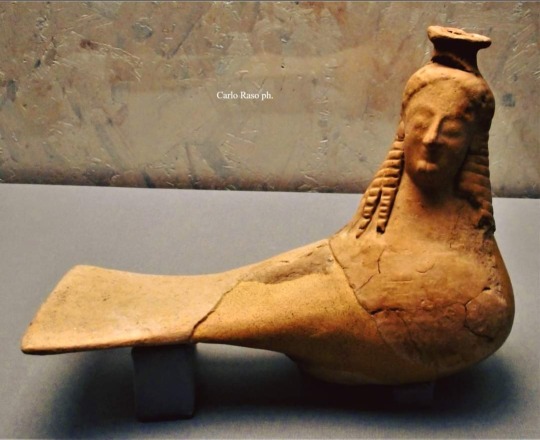
Bottle-askos in the shape of a siren (2nd half 6th century BC) from Locri / Southern Italy's Calabria. National Museum of Magna Graecia (Reggio Calabria, Italy).
In the wine-dark expanse of the Mediterranean Sea, far from the halls of civilization, there was once a small island—or so Homer, the famed poet of Ancient Greece, wrote in his epic The Odyssey. No buildings occupied its flowery meadows; no fisherman worked its shores. Those who passed in their black ships heard only voices, twining over the windless waves, singing a song that promised knowledge of all things. Once they heard it, they were enchanted; they had no choice but to land and seek out the singers. Those who did never left the island; their bodies remained, rotting amid the flowers, for none who heard the Sirens' song could escape it.
The story of the Sirens has inspired writers, poets, and artists for millennia. But somewhere along the way their form was confused. Today, Sirens are almost always represented as voluptuous mermaids, whose beauty and sexuality lure men to their deaths. But the Classical Greeks understood the Sirens differently: as bird-women, creatures that Mediterranean cultures traditionally associated with hidden knowledge.
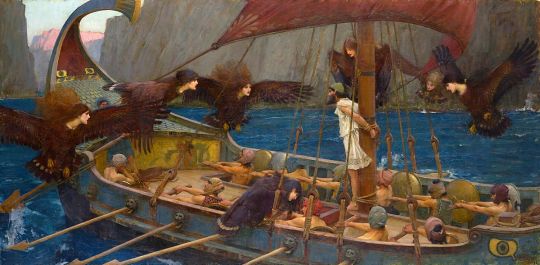
Sirens first appear in the literary record with the Odyssey (written around 750 BCE) in a segment that’s much briefer than you’d think considering the cultural impact of these mystical, singing creatures. It goes like this: Odysseus, warned by the enchantress Circe of the danger posed by the Sirens’ song, orders his crew to stuff their ears with wax. But, curious to a fault, he has himself bound to the ship’s mast so he can listen without flinging himself into the sea. The Sirens promise him tales of all that had occurred during the war at Troy, and everywhere else besides; enchanted, he begs his crew to release him. He rants, raves, and threatens, but to no avail. His crew sails on until the song fades in the distance, and so saves his life.
Homer doesn’t describe the Sirens’ physical appearance in his epic poem, Wilson says. But in ceramic paintings and tomb sculptures from the time of writing, and centuries after, Sirens were usually depicted with taloned feet, feathered wings, and a beautiful human face. The bird-body of the Siren is significant to Wilson: In the eyes of traditional peoples all across Europe, birds were often graced with an otherworldliness associated with gods, spirits, and omens.

They inhabit the water, the air, and the earth. They’re also associated with song; they have voices that are not human voices, and kinds of movement that are not the same as human kinds of movement.
The Sirens’ role in tomb art is particularly telling. In ancient Mediterranean and Middle Eastern cultures—as far back as 7,000 years ago—birds were often depicted carrying spirits to the underworld. In Southern Italy's Calabria, archaeologists unearthed several Greek askos (unguentary vessel) in shape of sirens, most commonly found in tombs.
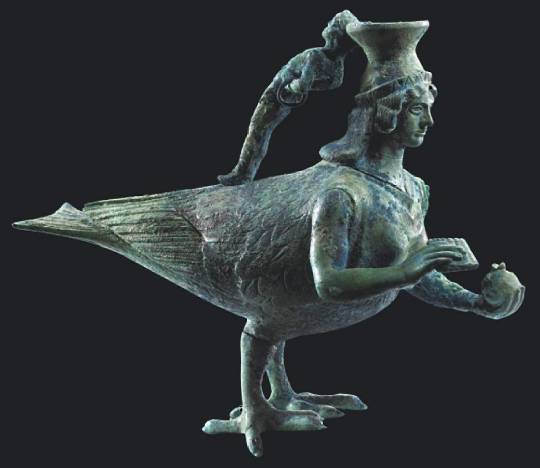
Bronze askos in the shape of a siren (5th century BC) from Crotone, Calabria, Italy - Archaeological Museum of Crotone.
Jump ahead a few millennia to 1,550 BCE, by which time Ba-birds, depictions of departing souls as human-faced birds, began appearing in Egypt. That connection between birds and dead souls seems to have then hopped over to Greece: Writing in the 5th century BCE, the playwright Euripides described the Sirens as at the beck and call of Persephone, one of the rulers of the underworld, while other writers identified the Sirens as rivals and dark echoes of the Muses, those goddesses of creativity.
These are the Sirens the Ancient Greeks would have recognized: bird creatures of the underworld, bridging the human world and what lies beyond. The Sirens—and their fateful songs—then offered a glimpse behind the veil, a chance to hear how earthly glories would echo in eternity. The question of what song the Sirens sing, what is this forbidden knowledge, what's wrong with it, what's the temptation—the text leaves a lot of open space there. Therein lies the seduction.
Yet today, mermaids or beautiful sea nymphs replace the dark, winged Sirens of ancient times.
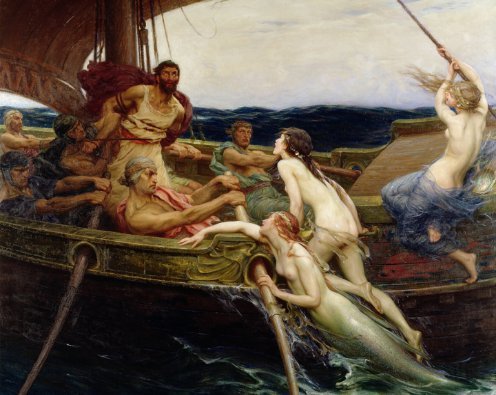
It is during the Middle Ages that the image of the siren began its shift from bird-woman to mermaid . With the transformation of the siren's image, the attributes associated with female monsters shifted. This suggests a change in the traits that were considered monstrous in women. The siren's movement from a frightening bird-woman to a beautiful mermaid represents female beauty becoming monstrous. Throughout the Middle Ages sirens increasingly represented a male fear of female seduction, suggesting a growing fear of female sexuality.
For medieval Christians, sirens were heavily associated with female sin.
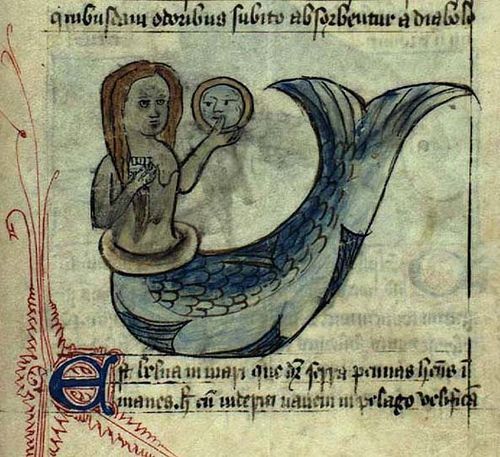
However it happened, the identification of Sirens with mermaids seems to have affected later translations of the Odyssey, and ultimately common knowledge of Sirens. Translators in the 19th and 20th centuries cast the Sirens in a sexualized light. In one prose translation, the Sirens speak of “the sweet voice from our lips,” despite the word στομάτων directly translating to the less sensual “mouths.” Another adds flowery descriptors of “each purling note/like honey twining/from our lips.” But unlike the Odyssey’s other island temptresses, Circe and Calypso, the Sirens get no admiring description of their faces or hair. Only their voice is described, and their field of bones and flowers.

That’s a pretty strong indicator that the Sirens are not meant to be read as offering a sexual temptation. You can kiss lips; mouths devour.
Folklore and mythology move on, given enough time. Today, the Siren is just another word for mermaid, and is likely to remain so. But there’s something richly thematic about the Sirens of Classical Greece that deserves to be remembered: in-between creatures on a lonely island, floating between the boundaries of life and death, and offering an irresistible song of both. Water-temptresses are a dime a dozen; the Sirens offer wisdom.
Follow us on Instagram, @calabria_mediterranea

#sirens#calabria#homer#italy#italia#south italy#southern italy#mediterranean#mediterranean sea#the odyssey#ancient greece#greek#greek art#art#terracotta#greek mythology#greek myth#underworld#mermaids#mythological creature#magna graecia#magna grecia#locri#folklore#mythology#siren#mermaid#crotone
88 notes
·
View notes
Text

MOST ICONIC BIRD CALL BRACKET: ROUND ONE: FERAL PIGEON vs. NIGHTINGALE
IN THE BLUE CORNER, get ready to witness an unexpected star rising from the streets, the feral fighter, the street pigeon!
once domestic, these unruly birds have returned to the wild environment of the concrete jungle. what it lacks in size or strength, it makes up for in being scrappy and street smart. this is a fighter that has not only survived, but thrived in environments that are too harsh for most wildlife. its grit and determination has earned it a loyal following among those who appreciate the never-say-die spirit it embodies. you'll know this bird from that soft and gentle cooing, but it might be harder to recognize without the added traffic and city ambiance.
IN THE RED CORNER, we have a bird with a voice like no other, the songbird sensation, the NIGHTINGALE!
don't let that plain appearance fool you - this is an opponent that packs a punch. this nocturnal vocalist's songs has been the subject of poems for over a thousand years, inspiring writers including homer, t.s eliot, shakespeare, and virgil. true to its name, this virtuoso of sound isn't just limited to daytime hours - it also shows off that impressive vocal range at night, whenever it wants, wherever it wants.
492 notes
·
View notes
Text
Countdown to Agatha: Day 767
Wanda: “Agatha, did you have a first edition of the Odyssey? Or maybe the Iliad?”
Agatha: “The Odyssey, the Illiad- The epic Greek poems from antiquity?”
Wanda: “Yeah!”
Y/N: “Ooo, did you attend the book signing? Did you meet Homer? Was he an instant phenomenon then or was the line really short because he was an emerging author?”
Agatha: “Alright, ignoring the fact that that those stories may have been created through oral tradition and thus might have gone through many iterations before the first written copy or even is the work of solely Homer, do you REALLY think I am that old?”
Y/N: “Well - didn’t you say you were the inspiration for that one character? The one with the face that sunk a thousand ships?”
Agatha: “The face that LAUNCHED a thousand ships”
Wanda: “Was it to get away from you?”
Agatha: “SHUT UP”
#agatha is Helen of Troy confirmed#welcome to the agatha dunking session she’s getting WATERBOARDED#wandavision#agatha harkness#house of harkness#agatha all along#hahndavision#house of harkness counter#marvel#wanda maximoff#agatha harkness x reader#wanda maximoff x reader#coven of chaos counter#coven of chaos#darkhold diaries counter#incorrect marvel quotes#agatha: darkhold diaries#darkhold diaries#wagatha#wanda x agatha#agatha
65 notes
·
View notes
Text
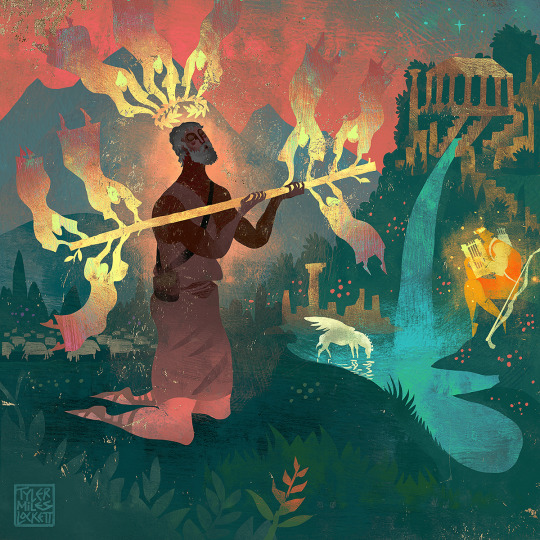
Unlike Homer, we do have some record of the poet Hesiod, as he brought details of his personal life into his work. His epic poems are invaluable reference sources for the formation of the cosmos and the genealogies of the Greek Gods.
The first major extant (still existing) work of Hesiod’s is the epic poem and invocation hymn “Theogony,” (origin of the gods, 700 B.C.E.) In the poem, while shepherding sheep upon Mount Helicon, Hesiod tells of encountering the Muses who gift Hesiod a laurel staff, a symbol of poetic authority, and breathing into him the divine breath of inspiration. In this poem Hesiod gives us the forming of the universe from Uranus (sky) and Gaia (earth) and the cyclops, giants, and Titans to follow. In this work with have the triple succession motif of sons overthrowing fathers with Cronus overthrowing Uranus, and then Zeus overthrowing Cronus in the Titanomachy (war between Olympians and titans.)
His second work, “Works and Days” is a didactic collection of pastoral poetry tales used to illustrate for his ne’er-do-well brother, Perses, how to lead a more virtuous life through hard work, humility and justice. Here we get the tales of Prometheus stealing fire from Zeus and Pandora opening the jar and releasing evil upon mankind. Hesiod also lists the fascinating fives ages of man; the Golden age, the Silver age, the Bronze age, the Heroic age, and the Iron age. The poem ends with ruminations on seasons and agricultural wisdom.
In my illustration we see the sacred fountain of Hippocrene in the background, which was said to have poured forth when Pegasus struck his hoof into the ground. The sacred stream was said to give the drinker poetic inspiration.
One tale of Hesiod’s death is that the oracle of Delphi told him he would die at Nemea, so he fled to Locris, where he, unable to escape fate, eventually died at the temple to Nemean Zeus, fulfilling the prophecy in typical ironic fashion.
Thanks for looking and reading, and for rehashing/reblogging my works you fine Tumblr folks! Happy 2023! xoxo
If you want to see more of my art, please click my linktree: https://linktr.ee/tylermileslockett
#pagan#hellenism#greek mythology#tagamemnon#mythology tag#percyjackson#classicscommunity#dark academia#greek#greekmyths#classical literature#percy jackon and the olympians#pjo#homer#iliad#classics#artmerch#mythologyart#art#artists on tumblr#artists on etsy#odyssey#literature#hesiod#apollo#pegasus#ancientworld
639 notes
·
View notes
Note
Hi! I’m pretty new to the world of Achilles and Patroclus (I read The Song Of Achilles last month) and I just saw your post about your love for them. When you said “there's just so much stuff out there about them (tsoa, hades game, the iliad, a bunch of other myths and adaptations, non fiction books, academic papers etc)” I was wondering if you could touch on the other myths and adaptations part maybe? I’m not exactly sure where to begin there but I would appreciate any guidance you could give!
Oh boy I don't know where to start either because there's a LOT. I don't want to overwhelm you so I'll just list a few key myths and adaptations off the top of my head:
Adaptations
So as far as adaptations go, I will include works where both Achilles and Patroclus show up and that are inspired by the Iliad.
Hades Game: I'm pretty sure you're already familiar with this, just mentioning it just in case!
Aristos the musical: it's a musical as the name suggests, and it revolves around Achilles and Patroclus' lives from Pelion all the way to Troy. It's really lovely and has made me emotional on numerous occasions and I love revisiting it every so often! It also has a Tumblr account: @aristosmusical
Troilus and Cressida: this is Shakespeare's take on the Trojan War and it's quite interesting, not really faithful to the Iliad but offers a sort of different perspective on the characters and the events that led to Hector's death.
Achilles (1995) by Barry JC Purves: it's a short stop motion film using clay puppets, it's on Youtube and it's only 11 mins and I think it's worth a watch! I find it very compelling visually and any adaptation where Achilles and Patroclus are lovers is a plus in my book 🫶
Holding Achilles: this is an Australian stage production by the Dead Puppet Society, I really enjoyed it and I found it an interesting blend of TSOA and Iliad Patrochilles, which also featured some cool new elements that I hadn't really seen before. It used to be free to watch for a while but now I think you have to pay to watch it, there's more info on their website.
The Silence of the Girls: a novel by Pat Barker, it's a take on the events of the Iliad mostly through Briseis' eyes, I personally didn't really like the book or the characterisations but hey both Achilles and Patroclus are in it so it might be worth a read.
There are some other novels I've heard of where Achilles and Patroclus appear (A Thousand Ships by Natalie Haynes, Wrath Goddess Sing by Maya Deane) and also a TV show called Troy: Fall of a City but I haven't read/watched them so I can't really rec them
Myths
Most myths revolve around Achilles, there aren't that many with Patroclus I'm afraid, but here are some of my favourites:
Achilleid by Publius Papinius Statius: this is an epic poem about Achilles' stay on Skyros disguised as a girl and his involvement with Deidameia. It's interesting but I'd personally take the characterisations and events in it with a grain of salt because Romans were notorious for their unsympathetic portrayal of Greek Homeric heroes but it's still a cool thing that's out there and free to read online.
Iphigenia at Aulis: a tragedy by the ancient Greek playwright Euripides, it's basically the dramatised version of the myth of Iphigenia's sacrifice in Aulis which predates the Iliad, there are many obscure versions of this myth but Euripides' sort of updated version is my favourite, I will never shut up about this play!! Lots of a nuance and very interesting portrayals of Achilles, Agamemnon, Menelaus, Clytemnestra, Iphigenia and pretty much everyone in there, well worth a read.
Lost plays: there are several plays in which Achilles appears but that have been lost or survive only in fragments, but two of my favourites are Euripides' Telephus and Aeschylus' Myrmidons. Telephus takes place before the Trojan War, while the Greeks are on their way to Troy. I really like Achilles' characterisation in the fragments that remain and also the fact that he was already renowned for his knowledge of medicine and healing despite how young he was. The fragments that survive from Aeschylus' Myrmidons I think are fewer but the play was extremely popular at the time it was presented to the public and it sparked a lot of controversy re: Achilles and Patroclus' relationship and who tops/bottoms so I think that's kind of funny lol.
There are lots of other obscure little myths about Achilles that I've picked up by reading various books, papers and wiki posts on the matter and that are just too numerous to list here, but what I will mention and that I think concludes the myths section of this post pretty neatly is that the Iliad and the Odyssey are not the only works about the Trojan War that were written, merely the only works that survived. The rest of the books in the Epic Cycle have been preserved either in fragmentary form or in descriptions in other works, and I think the Epic Cycle wiki page is a good place to start if you want to get an idea of what each of those books contained.
I hope this helped! 💙
#patrochilles#achilles#patroclus#the iliad#homer's iliad#if I remember anything else I'll probably add to this post but I think that should be enough for now#there's just! so much stuff!!#happy reading/viewing/listening 😁
46 notes
·
View notes
Text
Hades and Persephone’s love in ancient texts 🖤






1. Ovid, Metamorphoses, X (Roman epic, C1st B.C to C1st A.D) = Orpheus says that Hades and Persephone are united in love and compares their marriage to his with Eurydice.
2. Lucan, Pharsalia, VI (Roman poem, C1 AD) = Persephone is mentioned to have a bond of love with Hades.
3. Claudian, Rape of Proserpina (Latin poem, late C4th A.D) = While Hades is taking Persephone to the Underworld, a terrified Persephone cries and laments her fate. But Hades feels genuine remorse for the fact that he had to abduct her and comforts Persephone by wiping away her tears and swearing to her a good marriage. Hades is mentioned to feel love for Persephone.
4. Lucian’s Dialogues of the dead (Greek satire, C2nd A.D) = A man asks Hades permission to go back to life and he refuses constantly until Persephone gives a suggestion.
5. Virgil, Georgics 1. 36 (Roman bucolic, C1st B.C) = Persephone prefers to stay with Hades than returning to her mother.
6. Homeric Hymn 2 to Demeter 1 (Greek epic, C7th or 6th B.C.) = Hades lets Persephone return to the surface when he learns about Demeter’s distress. Before she leaves, he promises her power and honor and swears that he’ll be a worthy husband- Persephone rejoices when she hears this.
Credits and inspiration for this post
#greek mythology#greek gods#hellenic polytheism#hellenic worship#hades deity#hades worship#hades and persephone
132 notes
·
View notes
Note
You mentioned that you were into a lot of adaptions, reinterpretations, and inspired works of the ancient Greek religion and lore, what are you into as far as the source materials? Are you a fan of the poems, a plays person, or do you prefer the philosophy? I personally started with pjo hyperfixation in elementary to the ancient Greek works in middle school and actually discovered Hadestown, tsoa, and Epic now that I'm in college so I'm curious how that affects what people prefer. I'm mostly a fan of the poems myself, I adore the Iliad and unpopular opinion but I really like the Dionysiaca. Obviously I enjoy the other stuff too, the Odyssey and Posthomerica and Homeric Hymns (Homeric Hymn 2 to Demeter my beloved) but the Iliad was the first one I read so it's always been my fav. I've only recently discovered that there were fans on Tumblr and AO3 for all of those outside pjo in the last couple months so sorry if I sound over eager! I'm just very excited.
Like you I started out with Percy Jackson in elementary! It was actually required reading believe it or not, and I fell in love. Since then I really love the adaptations of Greek Mythology (Epic, Hadestown, PJO musical, Ulysses dies at Dawn) and others such as book retellings like Madeline Millers works Circe and Song of Achilles. Also Jennifer Saints Ariadne, and a couple other books that I’m forgetting right now.
As for more source materials, I of course love reading the Odyssey and Iliad, although I think I lean towards the more moderns translations on those.
I do very much like the plays though! I am a involved a lot in theatre, so it’s inevitable. Medea holds a special place in my heart, as that’s the play I am most familiar with. Honestly, with no prompting, I could launch into a Medea monologue right now. In addition I have read Oedipus Rex (this dude has Problems), a bit of Antigone, and Agamemnon!
I can’t say I’ve read too many other source materials, but anything that mentions Greek Mythology slightly is sure to interest me. (Midsummer Nights Dream had a bit of references to Greek Mythology though I don’t think that counts enough. Also could launch into a Helena monologue)
Overall I would say I just enjoy all of it! I’m definitely looking into reading and learning more, but unfortunately I’ve been busy lately. I love finding people who love the same things though!!!
#Greek mythology#epic the musical#percy Jackson#this is a lot I know#Medea#the odyssey#The Iliad#Asks
32 notes
·
View notes
Text
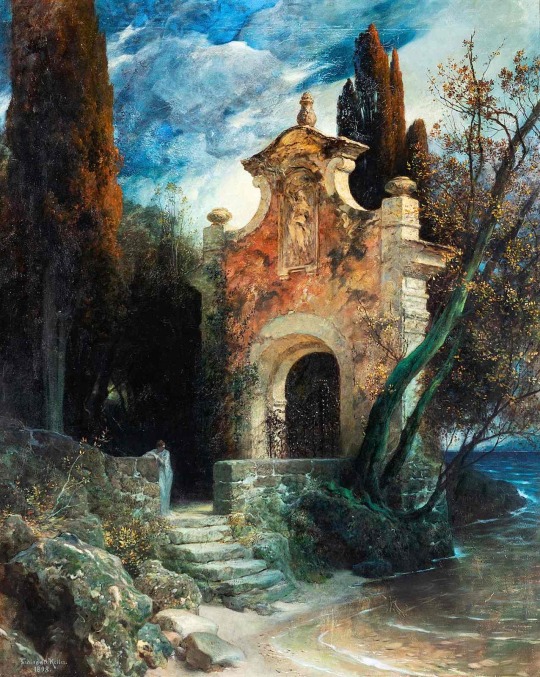
Baroque portal and cypresses on a Mediterranean shore by Ferdinand Keller
An ethereal female figure, cloaked like an antique column, pensive and deeply immersed in unfathomable thoughts, stands, as if sprung from the shadowy realm of a Homeric heroic epic, at the mysterious, cypress-covered bay of a dimly abysmal lyrical fantasy landscape, a place where time seems to stand still.
This almost otherworldly, ghostly dream world, idealised to elegant aloofness, springs from the dark, diffuse light and intoxicating, sultry musky haze of the sophisticated salon world of the late 19th century. In the spirit of «l'art pour l'art», this symbolist composition is detached from comprehensible plot contexts and rather a painted poem, dreamlike, albeit ominous in content.
In his later work, Ferdinand Keller abandoned the opulently staged heroism and pompous character of his history painting. Instead he devoted himself to an examination of his contemporary model, the symbolist painter Arnold Böcklin, who inspired him to create transcendent dream visions of a Mediterranean-antique character with a sombre, occult quality. Above all, Böcklin's most influential and enduringly successful pictorial invention, «The Isle of the Dead», an incunabulum of the late Romantic longing for death and of the decadent «fin de siècle», inspired the professor at the Akademie Karlsruhe to create this hitherto unknown masterpiece, which has remained in aristocratic private ownership since its creation.
#ferdinand keller#art#baroque#portal#gate#gateway#cypresses#mediterranean#shore#coast#sea#symbolist#romantic#europe#european#antiquity#architecture
155 notes
·
View notes
Text
Continuing from Part 2
Guilt (P3 + Footnotes)
"Odysseus" Meriones approached him, "Are you alright?"
Odysseus winced in pain. He hadn't realized he had clenched his fist so hard that it hurt him. He unclenched it.
"Yes..." he whispered, "Yes, I'm fine..."
Odysseus moaned. That baby...the look at that infant's face...Astyanax was gone...he had given his place to Telemachus. Priam's slain face was Laërtes...mourning Andromache was his wife... He grasped his head with both hands.
"Damn you Neoptolemus! Damn you Helen for starting it! Damn you Menelaus for dragging me into this... Damn you Palamedes! Damn you all! Why should I have taken this blood upon me?! Why did it have to be me?!"
He sighed.
"Polites...I want to be alone for a little while..."
"Do you think that is wise...?" Polites asked with hidden meaning.
"Wise!" Odysseus voiced like an echo, "No, perhaps not but I got tired of being wise for now..."
Polites sighed.
"At least add some water to your wine...please Odysseus"
Odysseus dismissed him with a move of his hand. He wasn't much in the mood for anything at that moment. He knew war wouldn't be pleasant but these events of just one night were taking the cake. He was exhausted; sleepless for two nights and a full day and right now the Sacker of Cities, the Man of Many Ways was terrified. He collapsed again and his tears overflowed from his eyes, wetting the table below. He grasped his wet hair with his fingers as if he was ready to uproot them.
"Gods! Please Athena, please, I beg of you...if you love me...p-protect my son! Let the miasma fall on me! Not him! I-I...I just wanted to g-go home! I just wanted to see them again...my Penelope...my Telemachus...! I-I never meant for this to happen! P-Please...! I beg of you if you love me...p-protect my son! Don't let the gods' wrath fall upon their heads! P-Please...! F-Forgive me! I...I just...I just wanted to go home!"
He couldn't decide what to pray for first... Words cascaded out of his mouth without any coherent way or syntax. He only prayed desperately, wetting with his tears the table. Sun was already setting and Troy was taken...but at what cost...
*
Menelaus and Agamemnon entered Odysseus's hut one after the other.
"I gotta give it to you, Odysseus!" Agamemnon said, "You WERE telling the truth when you said you could take Troy in one night!"
Odysseus was collapsed upon his chair, looking at them with an unreadable expression to his face. The jug was resting empty somewhere after the feet of his seat.
"Hm..." he hummed, "That's me. I am the trickster, remember? I lie, I scheme and I trick. That is what I do"
Agamemnon raised a brow.
"Are you drunk?!" He asked in disbelief
"One more shame to add to the events of this night..." Odysseus replied bitterly.
"Shame? I do not understand. We finally sacked the city. You can finally go home."
"Home..." Odysseus whispered, "I wonder...what shall I say to Penelope when she asks? Or Telemachus? If he asks 'father what did you do and you were away?', 'I was at war, my son', 'did you fight honorably and sack many cities?'... What shall I say for what we've done...?"
"I do not understand you Odysseus. It was your idea"
"Yeah somehow I do not doubt it..." Odysseus mumbled bitterly, "I was wrong, Agamemnon. This was not what I imagined...what I planned..."
He sighed shifting his position a bit to his chair.
"Priam is dead, you know that..."
"Yeah, like we expected to-..."
"On the altar. On the freaking altar, Agamemnon..."
"Yeah I heard..."
"Imagine that happening to any of us...in our homelands. If one cannot respect the holy laws then what?"
He played a bit with his empty cup.
"Priam murdered on the altar...Cassandra raped mercilessly and now Ajax looks for shelter to the very same altar he dragged her out of, to avoid being stoned to death..." the king of Ithaca rubbed the bridge of his nose, "...death...death and fire everywhere..."
"Odysseus..." spoke Menelaus, "I understand that you are grieving, it was not easy or pleasant but..."
"The boy...he was the same age as my son! Thrown off the wall..."
"Odysseus" Agamemnon spoke again, "I honestly don't understand you. Others would fly from joy with your glory. You had a good plan and it worked. Thanks to you we can all go home."
Odysseus's eyes became bottomless. Even Agamemnon had to lower his gaze against it.
"The blasphemy put us under the anger of gods, Agamemnon. Remember that. Listen..."
Agamemnon seemed like indeed trying to listen something.
"The Trojans are not the only ones mourning. We lost many good men too. We lost Achilles. Or have you forgotten?"
Agamemnon sighed deeply.
"His loss...was tragic indeed" he finally said, "we had our differences but his loss was a great price..."
"Quite so..." Odysseus whispered, "was it really worth it? The price we had to pay to sack Troy?"
He shifted his weight to his chair lethargically. He rubbed his forehead with his free hand for a second. The dizziness bad settled for real in his brain. He leaned his head back again, earning a small cracking sound from his neck.
"And since we are at it, I have a question for you, Agamemnon, son of Atreus, the first among the Greeks... What did the Trojans REALLY do to us to deserve such an end?"
"You're drunk! You don't know what you're talking about!"
Odysseus snorted humorlessly.
"Oh, I am drunk, alright. But I know exactly what I am talking about. And you do too. They took Helen, sure, or at least one of them did. But their real crime against us was that they protected their lands...from us. That's what we would have done as well..."
Agamemnon was ready to speak again but Menelaus stopped him.
"Brother, that's enough"
He then turned ti Odysseus sympathetically.
"Look, Odysseus, I understand that it hurts and I am sorry too that I put you through that indirectly, but please do not melt away. No matter what the actions of others was not your choice."
Odysseus said nothing. He only sighed.
"Will you join us at the games later? You are the hero of the day. Your presence is asked for."
Odysseus scoffed.
"Oh I will be there, alright. I never miss a good party!"
Menelaus smiled sadly.
"Thank you, Odysseus...for everything. I really mean it... I will see you later, when you sober up a little..."
He looked at his friend and added;
"And...we shall mention none...of this" he pointed at him indicating his condition.
Odysseus soullessly nodded as if wanting to attempt some humor.
"Thanks...I appreciate it"
Agamemnon was ready to say something but apparently he decided against it. He only sighed and turned to leave before finally asking;
"Will you come to take a pick from the spoils? You deserve it given it was thanks to you we got in"
The tired king made a dismissive move with his hand.
"No. I'm fine with whatever. Just include me to the next lottery" he replied indifferently
"Are you sure? You deserve a better share"
Odysseus smiled humorlessly.
"Last time I chose and defended my choice, we lost Aias the Telamonian. I think we lost enough for one decade, don't you think?"
It was a failure of attempt for humor and he knew it but Agamemnon only sighed.
"Suit yourself" he said defeated, heading for the exit
Menelaus was about to do the same but apparently something made him stop and turn around.
"Odysseus?"
"Hm?"
"Thank you...truly... You gave me back my honor
Odysseus snorted again.
"With the cost of mine..." he whispered bitterly, "Not that anyone ever thought I had any..."
The king of Sparta, though, shook his head negatively.
"To me you will always be the greatest of all Greeks"
The man who endured all torments looked up and for the first tike a small smile rose to his dry lips. That word of kindness was what he needed for his tormented heart to feel some sort of hope. At least there was finally one who neither blamed him nor glorified him. Menelaus saw his torment and responded. That was enough.
"Thank you..." he whispered
Menelaus nodded his head in return.
"Now rest, my friend. We have a long way before us...we are going home..."
Home...the tormented king of Ithaca thought. Yes, finally they could go home. After 10 endless years they could finally embrace their families. Just few more months of journey and Odysseus could finally go home... All he had to do was to learn to live with what he did... He watched both the kings through his cloudy vision, getting out of his tent and Polites coming back in.
"I am sorry, Odysseus! I couldn't stop them!"
Odysseus dismissed him with a hand gesture once more.
"Don't sweat it, Polites. Stopping a king seems impossible. Gods help us with two!"
Polites smiled softly. At least he would gain some of his humor back, he thought.
"Help me get to my bed, Polites..." sighed Odysseus hoarsely, "I need to rest... I am very tired..."
~~~~
Oh gosh what have I done?! Hehehehe well not sorry...not really! 😆 I hope you enjoyed this ride.
As you see I tried incorporating some of the Epic Cycle to the situation but I did tamper around with the timeliness. The Epic Cycle is a lovely mess anyways and holds many contradictions with the homeric poems but it includes many things.
Now the fragmentary poem Iliou Persis is sven mentioned how Odysseus throws Astyanax off the walls but most sources have Neoptolemus donit and I do agree with those more. Now in Trojan Women by Eurypedes the messenger Talthybius tells Andromache that Odysseus schemed so that her son would be thrown off the walls and that he persuaded the Greeks they couldn't raise the baby. Odysseus doesn't strike much as a baby killer in Odyssey or even the Iliad although he is known for being cruel in his punishments (see the excecution of the 50 conspiring slave girls) but nowhere jn Odyssey does Odysseus refer to that fact even if he does speak of his regrets for other actions of his and if he HAD thrown Astyanax off the walls himself I doubt he wouldn't have made any reference to it so I believe that Iliou Persis should he treated like Telegony when it comes to the homeric poems; a bit contradictory to the homeric epics (unless there is some lost fragment that tells us how Odysseus went on a rampage he could not remember lol 😆 ) so I made a mixture of all the above to show how Odysseus "killed" Astyanax or subconsciously persuaded the Greeks to do it and I added the role of Talthybius here too.
Iliou Persis seems to also be the most violent form when it comes to the Greek side such as that they offer Priam's daughter Polyxene to Achilles's tomb as a sacrifice, thus causing the rage of Athena (I swear the thing was written by a Trojan lol 😆) Eurypedes mentions how Polyxene was offered as slave to Achilles symbolically so she should serve his tomb. I also added the detail of Odysseus trying to persuade Neoptolemus to choose her as his price to speak Andromache but his attempts are a failure.
Drunkenness was severely discouraged in ancient geeece thus the concern in Polites's words when Odysseus uses it as a coping mechanism for the traumatic events of the night. Moreover the Greeks always mixed their wine with water (thus having the modern name for wine in Greek κρασί which comes from the verb in ancient greek which means "to mix") the wine that was not watered was called άκρατον and it was qlmost never consumed unless dipped in bread. The analogy between wine and water depended.
In this story I depict Neoptolemus as somehow a nemesis to Odysseus. Similar to what Agamemnon or Hector were for Achilles. I have no idea why but the idea stuck with me especially since the two are the two candidates for the murder of Astyanax. Somehow I imagined them again as the polar opposites thus the two of them having tension.
Odysseus mentions Thersites who was beaten really badly by him in the Iliad. In other sources it is mentioned that Odysseus has him stoned to death after Theraites attempts treason. In this story Thersites was already dead.
I know that for Palamedes the most famous version of his end comes from Hygenius who writes how Odysseus frames him for treason. However Pausanias mentions from the Epic Cycle that Palamedes drowned at a fishing expedition and that "he believes the murderers were Odysseus and Diomedes". 🤔 somehow I wanted to use a lesser known version plus give a bit room to doubt for instance did Palamedes really fell by accident and Odysseus is guilty for not helping? Or perhaps Odysseus pushed him? Maybe he held him under? Dunno. Leave it to your imagination. I know is not so spicy as the framing story but bare with me hehehe
Talthybius here simply hears "it was Odysseus who planned it" thus sending that information yo Andromache without the rest of the details..
Astyanax uttering a word was totally random. If he were an infant a few months old or almost a year old in Iliad that means he would be around 1 to 1.5 years old when Troy fell so I thought it would be more impactful if the poor baby uttered a word before his end.
The interaction with Andromache was placed there for the dramatics and the impact. When Andromache screams "MY BOY!" I was inspired by the series "The Tudors" when Anne Boleyn laments her final miscarriage (by the way I think Natalie Dormer would make an amazing Andromache!)
The story with Palamedes was also added to make the connection between two mothers and their impact to Odysseus. Plus I thought it would make more sense if Odysseus was furious not only for being embarrassed or that he has to go to war but because Palamedes put his son in danger. (Of course Penelope would be part of that scheme!)
Odysseus refusing to participate at the choice of spoils was just a random detail but as a general rule from Eurypedes it seems that he eats the old Ekavi (Hecuba) as his slave (probably she would be to serve Penelope( so I imagined Odysseus wouldn't want to choose but getting whatever would be lucky for him to further implicate that he wouldn't want anything further to do with the war. He also mentions the incident when Telamonian Aias (aka the great Ajax) went mad when Odysseus won Achilles's armor from him and then he killed himself in shame.
I also wanted to portray the friendship between Menelaus and Odysseus which seems to be really strong since Menelaus always talks with the warmest words for Odysseus.
For further questions and analysis please ask me to the comment section or reblog etc!
I wanna also tag some of my best friends commenters rebloggers etc! Thank you guys! Sorry if I forget anyone!
@loco-bird @aaronofithaca05 @tunguszka20 @doob-or-something @jarondont @prompted-wordsmith @simugeuge @fangirlofallthefanthings
#greek mythology#odysseus#the odyssey#the iliad#greek myth#odyssey#the odyssey 1997#polytalas the one who suffers too much#polytalas#post iliad technically?#iliad fanfic#iliad fanfiction#sacking of troy#massacre of troy#odysseus was severely traumatized#trauma#odysseus of ithaca#polites#agamemnon#menelaus#tagamemnon#homeric poems inspirations#homeric poems#homeric epics#homer#odysseus and penelope#epic
40 notes
·
View notes
Note
Can you explain the Hyperboera theory please? Is it the white people version of the Yakub thing?
The Hyperborea theory is actually more based in reality than the fantasy of Yakub, and like all good things, we begin with Greek Myth.
In Greek myth, Hyperborea was a land located to the far north of the known world, it was so remote it was considered even beyond the North Wind.
There a legendary race known as the Hyperboreans lived, and worshipped the sun god Apollo.
Herodotus wrote that the 7th century BC, the poet Aristeas wrote of the Hyperboreans in a poem called Arimaspea, about a journey to the Issedones, who are estimated to have lived in the Kazakh Steppe.
Beyond these lived the one-eyed Arimaspians, further on the gold-guarding griffins, and beyond these the Hyperboreans.
Herodotus assumed that Hyperborea lay somewhere in Northeast Asia.
Homer placed Boreas in Thrace, and therefore Hyperborea was in his opinion north of Thrace, in Dacia.
Heraclides Ponticus and Antimachus in contrast identified the Riphean Mountains with the Alps, and the Hyperboreans as a Celtic tribe (perhaps the Helvetii) who lived just beyond them.
Aristotle placed the Riphean mountains on the borders of Scythia, and Hyperborea further north.
Hecataeus of Abdera and others believed Hyperborea was Britain.
Later Roman, and Greek sources continued to change the location of the Riphean mountains, the home of Boreas, as well as Hyperborea, which was supposedly located beyond them.
However, all of the sources agreed the locations of the mountains and Hyperborea were far north of Greece and southern Europe.
Simmias of Rhodes in the 3rd century BC connected Hyperborea to the Massagetae and Posidonius in the 1st century BC to the Western Celts, but Pomponius Mela placed them even further north in the vicinity of the Arctic.
This final connection was what stuck in the minds of those who would later propose a location for Hyperborea.
However, later writers disagreed on the existence and location of Hyperborea, with some regarding it as purely mythological, and others connecting the Hyperboreans to real-world peoples and places in northern Eurasia (ie. Britain, Scandinavia, or Siberia).
In medieval and Renaissance literature, the Hyperboreans came to signify remoteness and exoticism.
Modern scholars consider the Hyperborean myth to be an amalgam of ideas from ancient utopianism, "edge of the earth" stories, the cult of Apollo, and exaggerated reports of phenomena in northern Europe known as the Arctic or "midnight sun."
Since Herodotus places Hyperborea beyond the Massagetae and Issedones, both Central Asian peoples, it appears that his Hyperborea may have been in Siberia.
Heracles sought the golden-antlered hind of Artemis in Hyperborea. As the reindeer is the only deer species of which females bear antlers, this would suggest an arctic or subarctic region.
This has led some to believe that the Chinese are Hyperboreans, while others deny this as Reindeer also appear in Northern Europe, meaning Heracles could have sought the thr golden-antlered hind of Artemis in Scandinavia, meaning Hyperborea could have been Norse.
It would be this connection that stuck.
Hyperborea in Greek myth however was not an icy land, it was a warm, sunny land that existed beyond Boreas, who was credited for creating cold climates.
However, the idea of Hyperborea being in the Arctic is the idea that stuck.
Now, this ask was in context to the Indo-European hypothesis, which stipulates that the people who became Indo-Europeans came from Hyperborea, which is correct and incorrect, while yes, the Indo-European people's all come from the same tribal lineage, we did not emerge from the Arctic during an ice age.
Now, this idea stuck itself in the minds of both Russian and Indian nationalists, this was inspired by the works of Bal Gangadhar Tilak in his The Arctic Home in the Vedas, and the Austro-Hungarian ethnologist Karl Penka in his Origins of the Aryans.
Soviet Indologist Natalia R. Guseva and Soviet ethnographer S. V. Zharnikova, influenced by the works, argued for a northern Urals Arctic homeland of the Indo-Aryan and Slavic peoples.
This never caught on outside of Russia and India.
All of this, right now, is plausible, Indo-European people's did come from the same tribal bands of Proto-Indo-Europeans that swept across, and subsequently conquered Eurasia, and North Africa, they did originate from either the steppes of central Asia or the mountains of eastern Europe, their land would have been an alien landscape to the ancient Greeks who would hear of this land beyond Boreas through oral traditions, and so on.
Now, we get into the part that makes the Hyperborea theory, like the Yakub theory, and like all absurd things, we can thank the French.
Robert Charroux first related the Hyperboreans to an ancient astronaut race of "reputedly very large, very white people" who had chosen "the least warm area on the earth because it corresponded more closely to their own climate on the planet from which they originated".
This stuck, and then evolved over the decades to become the modern Hyperborea meme, which claims white people were created, or are aliens, destined to rule the world from beneath the Arctic, or the moon, and the Nazis are also there;
24 notes
·
View notes
Text
⋆.˚ ᡣ𐭩 .𖥔˚ The Nine Muses ⋆.˚ ᡣ𐭩 .𖥔˚
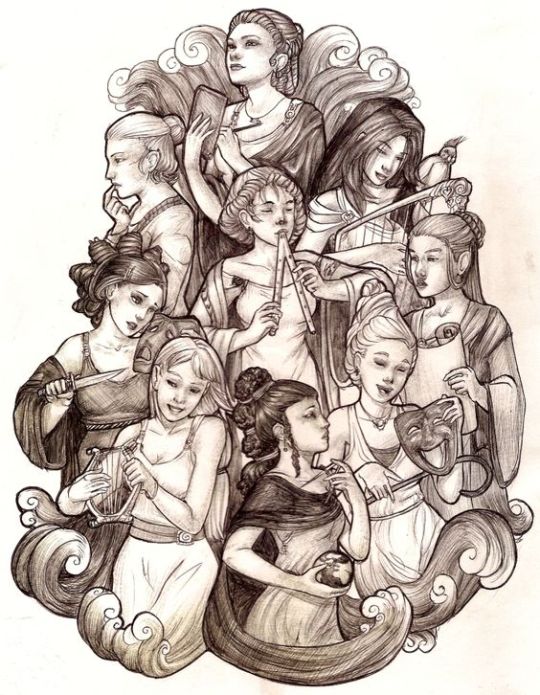
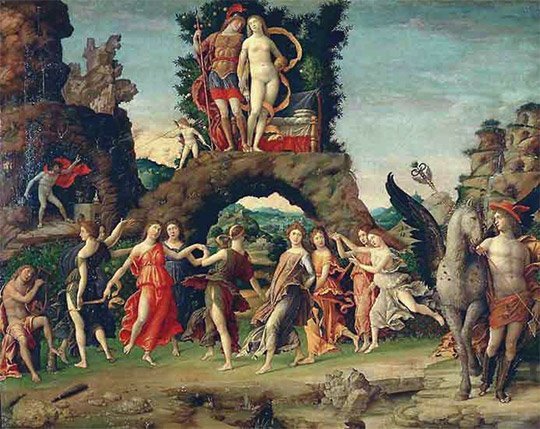
In Greek mythology, there is a group of nine goddesses called the muses. They are responsible for inspiring artists, poets, and writers. The word muse comes from the Greek word "mosis", which means wish or desire. The word museum also comes from the word "muses".
The myth of their creation is that Zeus (disguising himself as a Sheppard), slept with Mnemosyne for nine nights in a row, producing nine sisters. Mnemosyne gave her daughters to Eufime and Apollo, who raised them with a great fondness of the arts.
The nine muses were:
Clio - Created the study of history and guitar. She was a goddess of creativity. Her role was mostly to attend political meetings. In ancient Greece, history was called "clio" or "kleos". Often depicted with a book. She was also the goddess of memory.
Euterpe - Created many types of musical instruments, is often depicted playing a flute, while being surrounded by several other instruments. She is also usually associated with drums, violin, and guitar. The flute is her specialty.
Thalia - She discovered comedy and humor, which she was also protector of. Also discovered geometry and agriculture. She was depicted holding a comedy mask. She is a joyful young woman, almost always laughing.
Melpomene - She was the creator and protector of tragedy (opposite of Thalia). She was depicted with a tragedy mask and bearing a bat. She is the Greek goddess of theatre, along with Thalia. She is the mother of mermaids. She is know to have anything a woman could desire, except happiness.
Terpsichore - She is the muse of poetry and dancing. She is also known as the mother of sirens. She was the protector of dancing and loved music. Invented the harp. Also invented education. She loves having fun and being happy. She is depicted as a young woman wearing laurels on her head, with a harp, or dancing.
Erato - Protector of love, love poetry, and also marriage and weddings. Her name comes from "Eros" which is the feeling of falling in love. She is depicted with a lyre and love arrows + bow. She is associated with roses, myrtle, and turtle doves.
Polymnia - Protector of divine hymns and mimic art. Invent geometry and grammar. She is often in meditation or a pensive state. Depicted looking to the sky holding a lyre. She created harmony as well. She is associated with the colour white.
Urania - Protector of celestial objects. Such as stars and planets. She invented astronomy. She is depicted bearing stars, a celestial sphere, and a bow compass. The planet was named after her as well as the Greek god.
Calliope - She was the oldest and most superior muse. Her role was so accompany kings to serve justice and peace. Protector of heroic poems. She is depicted holding laurels or a trumpet in one hand and Homeric poems in the other hand. She is also ruler of epic poetry. She taught Achilles how to sing and is known for her beautiful voice.
The nine muses have been inspiring artists for centuries.
αποχαιρετισμ��ς! ♡

19 notes
·
View notes
Text
Deconstructing "we love because he first loved us"
Gods are reflections of the people who write about them. God loved because humans loved first.
Early in my deconstruction, I really struggled with reframing the Bible as something other than the inerrant word of the Almighty Christian god. I'd operated for so long under the fundamentalist idea that every word was divinely inspired that it was difficult to think of it in any other way. Sure, I could take a verse or two apart and make counterpoints against specific arguments. But what about the book as a whole?
It really helped me to revisit other ancient texts that I'd read in school and learn about others that I hadn't heard of before. Eventually, I started thinking about the Bible as something like Homer's Iliad, Odyssey, or Ovid's Metamorphoses. The authors of these works make a lot of claims about both human events and divine interference, but I do not feel pressure to live my life by them. I do not fear the wrath of any of the gods in these poems and I do not view them as unquestionable, divinely inspired works.
I've been asked before, on this blog and by Christians in my life, if I can still find meaning in the Bible. And I do, just not universal meaning. Because none of these works are universal. I now see all of these works as human-made. They reflect the purpose, preference, and knowledge of the people who wrote them. And with that understanding, I finally let go of my fear of the Bible as the Word of God.
The violence, grace, and love of the Biblical god were extensions of the humans who wrote the Bible. He cared about the success of a specific group of people because they cared about themselves. He railed against their enemies because they did. He gave divine explanations because they were interested in understanding the workings of the world. And the Biblical god loved because they loved first.
19 notes
·
View notes
Text

part 5:
When the call went out to Greece’s greatest heroes, for fame and glory, to join Jason and his quest for the Golden fleece, only the bravest answered the call. Heroes like Hercules, Orpheus, Telamon, Peleus, and yes, Atalanta mustered her courage and journeyed to join them.
Appollonius of Rhodes wrote the epic poem “Argonautica” about Jason’s quest for the golden fleece around the 3rd century B.C. based on a much older tale, (referenced in Homer and Pindar). Apparently Appollonius elevated the romantic relationship between Jason and Medea, which in turn inspired latin poetry and Virgil’s Aeneid. In Appollonius tale, Atalanta shows up to join the Argonauts, but Jason turns her away, fearing having such a beautiful woman on board would cause conflict between his men. However, In Appollodorus “Library” (1-2nd century A.D.) he lists Atalanta as being one of the heroes who accompany Jason for the Golden fleece. Unfortunately, there are no surviving versions where we see the entirety of the journey with Atalanta involved, which begs the question; what would the adventure be like if Atalanta joined?
On the topic of sea quests, lets take a quick look at ancient Greek seafaring. The Argo ship is portrayed as a sort of Trireme (ancient warship with three rows of oars and curved prow). Developments in astronomy helped ancient sea sailors navigate through constellations like Ursa Minor (little dipper) , as well as moon cycles and eclipses. They also used “sounding weights” to measure sea depths, which helped to inform distances to land. There is evidence from around 100 B.C. of an ancient “Orrery” (solar model) tool for celestial navigation called the Antikythera Mechanism. This ingenious, hand-powered device contained gears and could predict and track astronomical positions and eclipses.
Thanks for looking and reading! :D To see more of my Greek myth illustrations: https://linktr.ee/tylermileslockett
#tagamemnon#mythology tag#greekmyths#pjo#percy jackson fanart#percy jackon and the olympians#percyjackson#classical literature#dark academia#classicscommunity#atalanta#artemis#ephesus#aphrodite#goddess#greek#roman#ancient greece#argo#argonautica#medea#calydonian boar#rhea#heroine#archer#ancient wonder of the world#7 wonders#temple of artemis#argonauts
816 notes
·
View notes